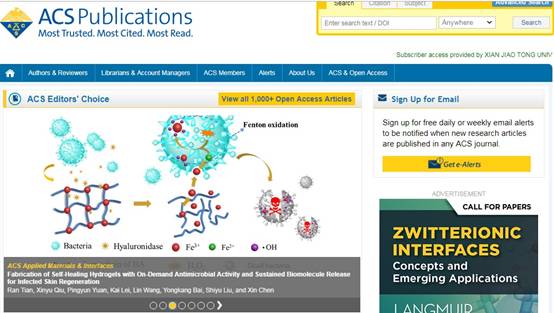Recently, Prof. Chen Xin from the School of Chemical Engineering and Technology has made important progress in the research of environmentally responsive intelligent biomedical materials. It is a rapid self-repairing hydrogel with intelligent antibacterial, long-acting biomolecule release and tissue regeneration induction function. The research results are published in the internationally renowned journal ACS Applied Materials & Interfaces (Fabrication of Self-Healing Hydrogels with On-Demand Antimicrobial Activity and Sustained Biomolecule Release for Infected Skin Regeneration, 2018, DOI: 10.1021/acsami.8b01740), Xi'an Jiaotong University 2017 Master graduate student Tian Ran is the first author of the article. The article was recommended by the American Chemical Society (ACS) as "ACS Editors' Choice"

ACS Editors' Choice is less than 1%. ACS selects 365 papers from 44,000 journal articles each year as ACS Editors' Choice, and becomes a free and open browsing resource to the public. The ACS Editors' Choice article is sent to the ACS homepage and scrolls for 7 days in the form of a picture, which is equivalent to the headline of the day. The editorial team of each of ACS's journals recommends that the selected paper must be a masterpiece of all papers in each magazine. Professor J. Stang, editor-in-chief of the American Chemical Society (JACS), academician of the American Academy of Sciences, the American Academy of Arts and Sciences, the Chinese Academy of Sciences, and the Hungarian Academy of Sciences, pointed out that each paper recommended by the ACS editor contains "making the field A new concept of change in the inherent mode."
This work focuses on solving bacterial infections, the most common and difficult problem to eradicate in tissue engineering research. In recent years, hydrogel-based biomaterials have played an important role in the field of tissue regeneration, but hydrogels are easily attacked by microorganisms during implantation and cause infection and inflammation in the body, and are easily worn during daily use. , which greatly hindered the exertion of its role. To this end, under the guidance of Professor Chen Xin, Tian Ran, after careful research and trial and error, developed a gel that can only trigger the antibacterial process by bacteria at the infected site and can be self-healing quickly. The gel can meet physiological needs. Selectively kills a variety of invasive bacteria, has no toxic side effects on normal tissues, can achieve rapid repair spontaneously, and has low material cost, safety and availability, simple operation, mild reaction conditions, wide application range, and is suitable for almost all laboratories. It can greatly promote the development of antibacterial gels.